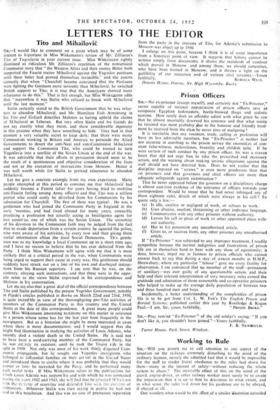Prison Officers
SIR,—No ex-prisoner (except myself), and certainly not " Ex-Prisoner," seems capable of rational appreciation of prison officers save as composite Egyptian taskmasters, beetle-browed thugs and sadistic morons. How rarely does an offender admit with what grace he can that he almost invariably deserved his sentence and that what sanity he retained was most probably flue to the humane and friendly treat- ment he received from the class he never tires of maligning ! It is inevitable that any vocation, trade, calling or profession will have its less admirable members, but " Ex-Prisoner " is neither fair nor accurate in ascribing to the prison service the enormities of con- stant false-witness, malevolence, brutality and childish spite. If he were certain of such conduct by any prison officer, his was a craven heart that did not urge him to take the prescribed and necessary action, and the warning about making serious allegations against the staff should not have deterred him. Does he not realise that the discipline imposed on " screws " is even more pbnderous than that on prisoners and that governors and chief officers are more than adequate, safeguards against victimisation ?
That he never appeared before the governor on a disciplinary charge is almost cast-iron evidence of the tolerance of officers towards your correspondent Would he swear that he had never infringed any of those eighteen rules, details of which were always in his cell ? To quote only a few:—
(a) Is idle, careless or negligent at work, or refuses to work.
(b) Uses abusive, insolent, threatening or other improper language.
(c) Communicates with any other prisoner without authority.
(d) Leaves his cell or place of work or other appointed place with- out authority.
(e) Has in his possession any unauthorised article.
(f) Gives to, or receives from, any other prisoner any unauthorised article.
If " Ex-Prisoner " was subjected to any improper treatment, I readily sympathise because the normal indignities and frustrations of prison life are in themselves hard to bear with any show of equanimity; it does, however, impel me in fairness to prison officials who cannot answer back to say that during a stay of sixteen months in H.M.P., Shrewsbury, where my particular " labour " gave me every facility for observation, I am convinced that no member of the staff—permanent or auxiliary—was ever guilty of any questionable action, and their help and their tolerant interpretation of very necessary rules earned the gratitude and admiration of those reasonable and co-operative prisoners who helped to make up the average daily population of between two and three hundred men and boys.
Incidentally, a better understanding of the complexities of prison life is to be got from Col. L. W. Fox's The English Prison and Borstal Systems, published earlier this year by Routledge & Kegan Paul.—I am, Sir,- yours faithfully, " PRISON BROKE."
SIR,—Pray remind " Ex-Prisoner " of the old soldier's saying: " If you don't like it, you shouldn't have joined."—Yours faithfully, F. B. NEWBOULD.
Turret House, Park Street, Windsor.


































 Previous page
Previous page